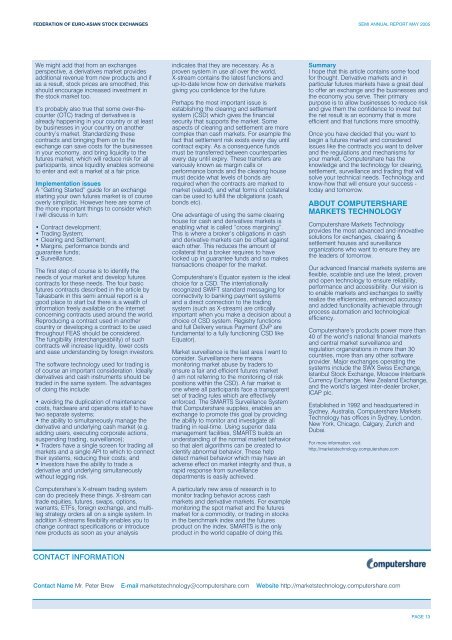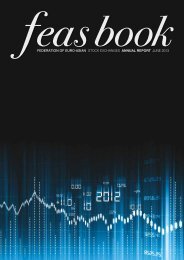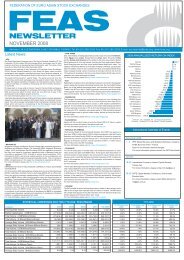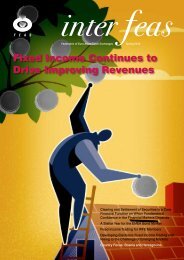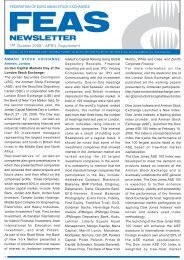Download - FEAS xxx.fh9
Download - FEAS xxx.fh9
Download - FEAS xxx.fh9
Create successful ePaper yourself
Turn your PDF publications into a flip-book with our unique Google optimized e-Paper software.
FEDERATION OF EURO-ASIAN STOCK EXCHANGES SEMI ANNUAL REPORT MAY 2005<br />
We might add that from an exchanges<br />
perspective, a derivatives market provides<br />
additional revenue from new products and if<br />
as a result, stock prices are smoothed, this<br />
should encourage increased investment in<br />
the stock market too.<br />
It’s probably also true that some over-thecounter<br />
(OTC) trading of derivatives is<br />
already happening in your country or at least<br />
by businesses in your country on another<br />
country’s market. Standardizing these<br />
contracts and bringing them on to the<br />
exchange can save costs for the businesses<br />
in your economy, and bring liquidity to the<br />
futures market, which will reduce risk for all<br />
participants, since liquidity enables someone<br />
to enter and exit a market at a fair price.<br />
Implementation issues<br />
A “Getting Started” guide for an exchange<br />
starting your own futures market is of course<br />
overly simplistic. However here are some of<br />
the more important things to consider which<br />
I will discuss in turn:<br />
• Contract development;<br />
• Trading System;<br />
• Clearing and Settlement;<br />
• Margins, performance bonds and<br />
guarantee funds;<br />
• Surveillance.<br />
The first step of course is to identify the<br />
needs of your market and develop futures<br />
contracts for these needs. The four basic<br />
futures contracts described in the article by<br />
Takasbank in this semi annual report is a<br />
good place to start but there is a wealth of<br />
information freely available on the internet<br />
concerning contracts used around the world.<br />
Reproducing a contract used in another<br />
country or developing a contract to be used<br />
throughout <strong>FEAS</strong> should be considered.<br />
The fungibility (interchangeability) of such<br />
contracts will increase liquidity, lower costs<br />
and ease understanding by foreign investors.<br />
The software technology used for trading is<br />
of course an important consideration. Ideally<br />
derivatives and cash instruments should be<br />
traded in the same system. The advantages<br />
of doing this include:<br />
• avoiding the duplication of maintenance<br />
costs, hardware and operations staff to have<br />
two separate systems;<br />
• the ability to simultaneously manage the<br />
derivative and underlying cash market (e.g.<br />
adding users, executing corporate actions,<br />
suspending trading, surveillance);<br />
• Traders have a single screen for trading all<br />
markets and a single API to which to connect<br />
their systems, reducing their costs; and<br />
• Investors have the ability to trade a<br />
derivative and underlying simultaneously<br />
without legging risk.<br />
Computershare’s X-stream trading system<br />
can do precisely these things. X-stream can<br />
trade equities, futures, swaps, options,<br />
warrants, ETFs, foreign exchange, and multileg<br />
strategy orders all on a single system. In<br />
addition X-streams flexibility enables you to<br />
change contract specifications or introduce<br />
new products as soon as your analysis<br />
CONTACT INFORMATION<br />
indicates that they are necessary. As a<br />
proven system in use all over the world,<br />
X-stream contains the latest functions and<br />
up-to-date know how on derivative markets<br />
giving you confidence for the future.<br />
Perhaps the most important issue is<br />
establishing the clearing and settlement<br />
system (CSD) which gives the financial<br />
security that supports the market. Some<br />
aspects of clearing and settlement are more<br />
complex than cash markets. For example the<br />
fact that settlement risk exists every day until<br />
contract expiry. As a consequence funds<br />
must be transferred between counterparties<br />
every day until expiry. These transfers are<br />
variously known as margin calls or<br />
performance bonds and the clearing house<br />
must decide what levels of bonds are<br />
required when the contracts are marked to<br />
market (valued), and what forms of collateral<br />
can be used to fulfill the obligations (cash,<br />
bonds etc).<br />
One advantage of using the same clearing<br />
house for cash and derivatives markets is<br />
enabling what is called “cross margining”.<br />
This is where a broker’s obligations in cash<br />
and derivative markets can be offset against<br />
each other. This reduces the amount of<br />
collateral that a broker requires to have<br />
locked up in guarantee funds and so makes<br />
transactions cheaper for the market.<br />
Computershare’s Equator system is the ideal<br />
choice for a CSD. The internationally<br />
recognized SWIFT standard messaging for<br />
connectivity to banking payment systems<br />
and a direct connection to the trading<br />
system (such as X-stream) are critically<br />
important when you make a decision about a<br />
choice of CSD system. Registry functions<br />
and full Delivery versus Payment (DvP are<br />
fundamental to a fully functioning CSD like<br />
Equator).<br />
Market surveillance is the last area I want to<br />
consider. Surveillance here means<br />
monitoring market abuse by traders to<br />
ensure a fair and efficient futures market<br />
(I am not referring to the monitoring of risk<br />
positions within the CSD). A fair market is<br />
one where all participants face a transparent<br />
set of trading rules which are effectively<br />
enforced. The SMARTS Surveillance System<br />
that Computershare supplies, enables an<br />
exchange to promote this goal by providing<br />
the ability to monitor and investigate all<br />
trading in real-time. Using superior data<br />
management facilities, SMARTS builds an<br />
understanding of the normal market behavior<br />
so that alert algorithms can be created to<br />
identify abnormal behavior. These help<br />
detect market behavior which may have an<br />
adverse effect on market integrity and thus, a<br />
rapid response from surveillance<br />
departments is easily achieved.<br />
A particularly new area of research is to<br />
monitor trading behavior across cash<br />
markets and derivative markets. For example<br />
monitoring the spot market and the futures<br />
market for a commodity, or trading in stocks<br />
in the benchmark index and the futures<br />
product on the index. SMARTS is the only<br />
product in the world capable of doing this.<br />
Summary<br />
I hope that this article contains some food<br />
for thought. Derivative markets and in<br />
particular futures markets have a great deal<br />
to offer an exchange and the businesses and<br />
the economy you serve. Their primary<br />
purpose is to allow businesses to reduce risk<br />
and give them the confidence to invest but<br />
the net result is an economy that is more<br />
efficient and that functions more smoothly.<br />
Once you have decided that you want to<br />
begin a futures market and considered<br />
issues like the contracts you want to deliver<br />
and the regulations and mechanisms for<br />
your market, Computershare has the<br />
knowledge and the technology for clearing,<br />
settlement, surveillance and trading that will<br />
solve your technical needs. Technology and<br />
know-how that will ensure your success -<br />
today and tomorrow.<br />
ABOUT COMPUTERSHARE<br />
MARKETS TECHNOLOGY<br />
Computershare Markets Technology<br />
provides the most advanced and innovative<br />
solutions for exchanges, clearing &<br />
settlement houses and surveillance<br />
organizations who want to ensure they are<br />
the leaders of tomorrow.<br />
Our advanced financial markets systems are<br />
flexible, scalable and use the latest, proven<br />
and open technology to ensure reliability,<br />
performance and accessibility. Our vision is<br />
to enable markets and exchanges to swiftly<br />
realize the efficiencies, enhanced accuracy<br />
and added functionality achievable through<br />
process automation and technological<br />
efficiency.<br />
Computershare’s products power more than<br />
40 of the world’s national financial markets<br />
and central market surveillance and<br />
regulation organizations in more than 30<br />
countries, more than any other software<br />
provider. Major exchanges operating the<br />
systems include the SWX Swiss Exchange,<br />
Istanbul Stock Exchange, Moscow Interbank<br />
Currency Exchange, New Zealand Exchange,<br />
and the world’s largest inter-dealer broker,<br />
ICAP plc.<br />
Established in 1992 and headquartered in<br />
Sydney, Australia, Computershare Markets<br />
Technology has offices in Sydney, London,<br />
New York, Chicago, Calgary, Zurich and<br />
Dubai.<br />
For more information, visit:<br />
http://marketstechnology.computershare.com<br />
Contact Name Mr. Peter Brew E-mail marketstechnology@computershare.com Website http://marketstechnology.computershare.com<br />
PAGE 13


